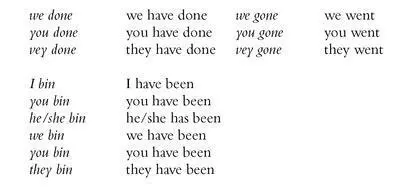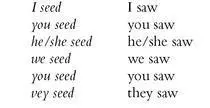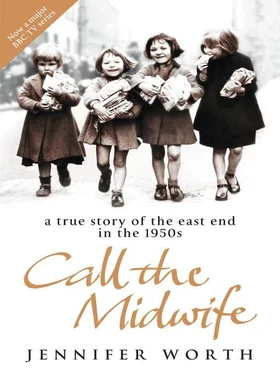As speed is all important, ‘h’ is seldom used. However, the suggestion (which is a sort of tasteless joke) that Cockneys trying to ‘talk proper’ put ‘h’ in the wrong places is not quite correct. I have listened very carefully, and only noticed an aspirated ‘h’ used for special emphasis, often with a glottal stop thrown in as well, e.g. oie was :henraged (I was enraged); bleedin’ ca:s :heverywhere (bleeding cats everywhere).
‘L’ in the middle or end of a word is usually lost and replaced by ‘oo’ or ‘w’. This is just about impossible to write convincingly. Consider: li:oo (little); bo:oo (bottle); vere’s a sayoo of too-oos darn Mioowaoo (there is a sale of tools down Millwall).
‘N’ and ‘m’ seem to be virtually interchangeable; a patient of mine had an emforced rest due to an emflamed leg . Another found aoo vose en:y bo:oos ah:side ve ’ahse enbarrussin ’. (all those empty bottles outside the house embarrassing). In Poplar people used to eat bre:m bu:er (bread and butter).
There are many other consonant changes, which vary from family to family and from street to street. ‘Sh’, ‘ch’, ‘zh’ (as in treasure) and ‘j’ replace almost anything, e.g. we’re garn :a shea-shoide (we’re going to the seaside). Ve doctor, ’e shpozhezh, vish fing wazh a washp shting azh wha: ‘azh shwelled up loike (the doctor he supposes, this thing was a wasp sting that has swelled up).
Wocha is the most common of all Cockney greetings, which has passed into Standard English. It is a very old form of “What are you (doing)?” The ‘ch’ in wocha replaces two or three words.
‘J’ can replace ‘d’. Jury Lane’s a jraugh:y ole plashe . (Drury Lane’s a draughty old place.)
‘J’ and ‘zh’ frequently join words together, e.g. Izee comin’, djou fink? (Is he coming, do you think?) ’ Azhye mum? (How is your Mum?).
The softening of fricatives may have arisen from the fag-end already mentioned. In fact to speak the dialect, one only has to purse the lips, imagine a Woodbine stuck somewhere on the lower lip, and let the words roll out with the minimum of mouth movement, and you’ve got it!
If you think representing consonants in written Cockney speech is hard, that is only because you haven’t tried the vowels! There are five vowels in the alphabet, plus ‘y’ and ‘w’, and no possible combination of these seven sounds can convey the complexity of Cockney vowels, which are washed and soaped and rinsed and put through the wringer, then stretched and twisted beyond anything that any phonetician can imagine. Italian is the language of pure vowels (the singer’s delight). English has diphthongs and a few triphthongs. Cockney has quadraphthongs and quinquaphthongs, septaphthongs and octophthongs, and God knows how many more. They all differ from person to person, from time to time, from place to place, and from meaning to meaning. Vowels are the vehicle by which voice inflexion is carried, and singers spend years studying the tone, colour and meaning that can be placed on vowels. The Cockney does it from birth.
Many Cockney vowels are elongated and made unnecessarily complex, e.g. loiedy , lahoiedy (lady). Others are reduced to almost nothing, e.g. fawna (foreigner).
Diphthongs in Standard English can become a single pure vowel in Cockney, e.g. par (power), sar (sour).
In writing, to render ‘I’ as ‘oi’ gives the wrong impression, because Cockneys do not say ‘oi’, as in oil or joy. They say something like aoiee .
‘Ow’ becomes an approximation of ‘aehr’, e.g. aehr naehr braehn caehr (how now brown cow).
‘O’ (as in go) is ‘eao’ (or something like it), e.g. ‘ e breaok ’is leig, feoo off of a waoo, ’e did (he broke his leg, fell off of the wall, he did); ’ e niver aw: :oo ’ave bin up vere, aoiee teoozh’im (he never ought to have been up there, I tells him).
I was struggling to express the Cockney accent in written form, until a professor of English Literature said to me, “You will not succeed, because it cannot be done. People have been trying since the fifteenth century, but it has never been successful.”
What a relief! I will struggle no more.
Grammar, Syntax and Idiom
In all countries at all times in history, the poorest of the poor have tended to live around the docks. Trapped by poverty, they have become isolated, and remained more or less static. This may be why Poplar of the 1950s existed in a sort of time warp, with habits, customs and family life being somewhat behind the times. With the closure of the docks, this changed.
Speech is a living entity, changing with the people. But Cockney language changes have lagged far behind those of middle-class English. Many Cockney speech forms - idioms, grammar and syntax - which today are considered flawed, are, in fact, very ancient speech forms that can be traced back to Tudor times.
Here are some typical examples:
Possessive (conjugated)

The ‘-self’ form becomes:

Verbs frequently take the third person singular for the whole conjugation:

Some expressions in the past tense use the past participle on its own, without the auxiliary (have, did):


The form of the past participle may itself be changed:

The demonstrative adjectives ‘these’ and ‘those’ are usually replaced by ‘them’, pronounced with a ‘v’, e.g. vem sosjis (these sausages), vem cabjis (those cabbages).
The relative pronouns ‘who’, ‘which’, and ‘that’ are replaced by ‘as’ and ‘what’, or sometimes both, e.g. a bloke wha: oie knows , or ve bloke as wha: oie knows (the bloke that I know).
‘So’ is often replaced by ‘that’, e.g. moei col’s va: bad, oei can: smeoo nuffink (my cold’s so bad, I can’t smell anything).
‘Here’ and ‘there’ are often used for emphasis, e.g. vish ’ere ca:s a good mahsher (this cat’s a good mouser) va: vere kid’s a roei: ‘an’foo (that kid’s a right handful).
Auxiliary verbs are frequently duplicated, e.g. oei woon: ‘arf ’a towd ’im orf, oei woon: (I wouldn’t half have told him off, I wouldn’t); ’ e don: ‘arf maihk yer laugh, ’e do . (he doesn’t half make you laugh, he does).
No: ‘alf (not half) is an emphatic positive in Cockney dialect.
‘Off of’ nearly always replaces ‘from’: oei go: i: off of ’Arry. ‘E give i: :a me (I got it from Harry. He gave it to me).
Adverbs frequently become adjectives: ‘ e done famous a: schoo-oo, vish term loeik (He did famously at school this term); ve job’s go:a be done proper, loeik (The job’s got to be done properly).
Читать дальше


















